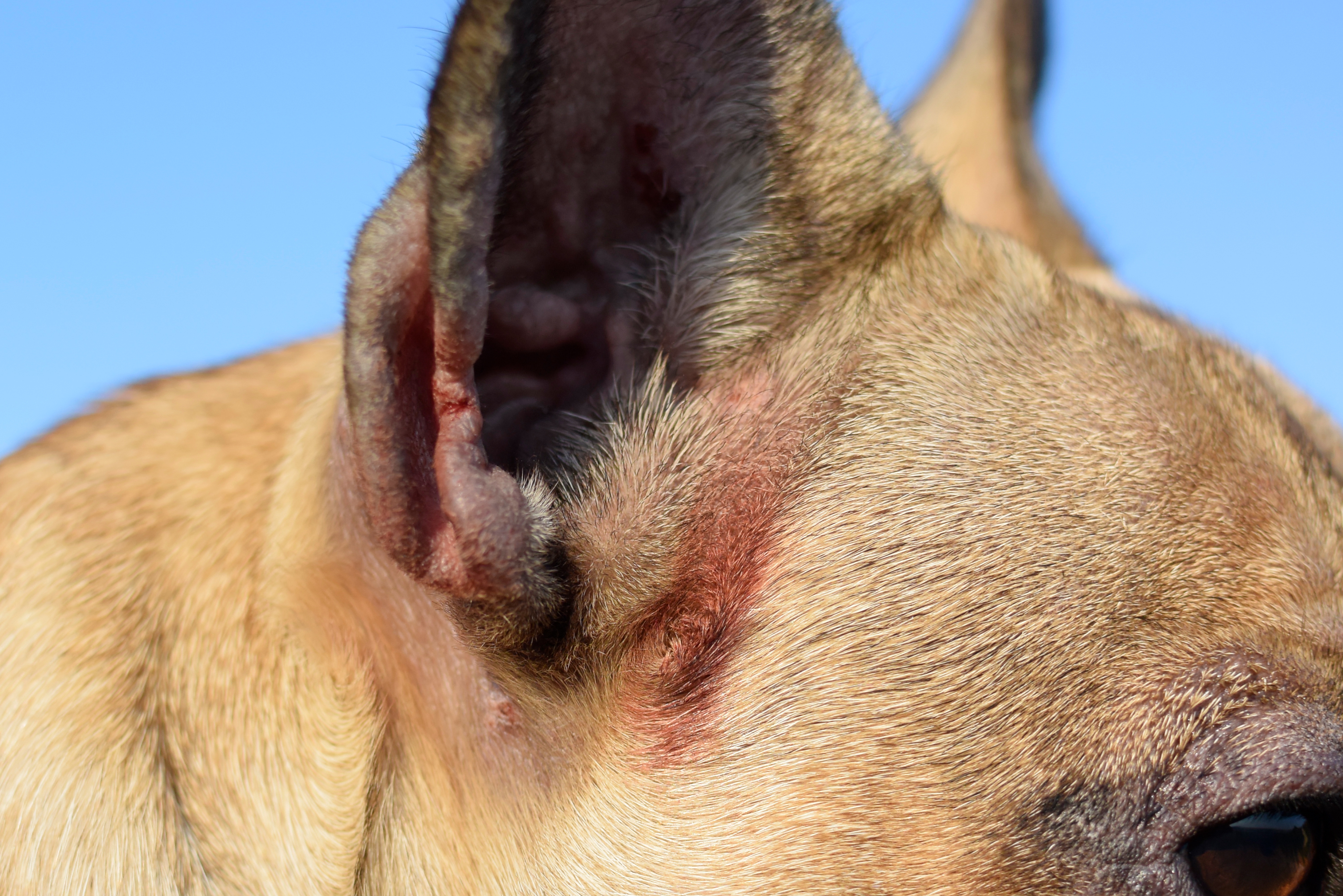
Can Dogs Get Eczema?
While eczema is extremely common in humans, it is also capable of affecting pets. However, most vets will refer to the condition by the name of “atopic dermatitis.”
This condition of the skin causes inflammation, itchiness, redness or rash-like symptoms. Eczema’s skin irritation is not a sign of a contagious disease and cannot be spread to other animals or people. Rather, it is caused by a reaction by the immune system, often triggered by an external irritant.
The symptoms of eczema often include red, inflamed skin that is either dry and flaky or crusty and oozing discharge. Your dog might lick, bite and scratch at the area incessantly to relive the itchiness. If your dog has licked or scratched too much, they may have caused hair loss and a wound to form.
Wet, or moist, eczema refers to inflammation and irritation that causes scaly-looking skin and discharge from the affected area. These areas are typically called hot spots and commonly affect dogs on the head, neck and feet. Dry eczema, on the other hand, results in a dry, flaky and itchy patch of skin. This skin might look gray or become wrinkled.
What causes eczema?
The most common cause of eczema in dogs is actually allergies. Allergic reactions can cause what’s known as atopic dermatitis—one of the forms of eczema. When the immune system faultily labels a substance as harmful to the body, it releases histamine and causes a reaction on the skin.
Atopic dermatitis can stem from a wide range of allergy types. Some of the most common are environmental allergies, or allergens in the air that are inhaled. After breathing in allergens like pollen, dust, mold spores, perfume, smoke or even some cleaning product fumes, your dog might break out in itchy, inflamed patches.
Other forms of allergies can cause eczema, too. Food allergies, caused by an allergenic ingredient in your dog’s diet, often result in both gastrointestinal problems and atopic dermatitis. Contact allergies, or allergens your pet physically touches, like grass or weeds, can cause allergic reactions at the point of contact. Even more allergic reactions might be caused by medications, flea bites, shampoos and more.

How to relieve eczema
If you discover that your dog is suffering from the itchy, inflamed effects of eczema, your first step should be taking your pup to the vet. The affected skin needs to be examined to make sure there are no secondary infections that must be treated right away.
If your vet suspects that your pup’s eczema is due to an allergic reaction, they might suggest an allergy test to narrow down the specific cause of your dog’s symptoms. Going through with an allergy test and identifying your dog’s particular allergies is one of the best ways to deal with eczema, since you can help your pup avoid contact with those allergens so they don’t get symptoms to begin with.
Unfortunately, it’s not always possible to shield your pup from their allergies, and reactions and eczema might still happen. In that case, there are a few things you can do to relieve your pup’s skin problems and make them more comfortable.
- Medication: If your dog’s allergies and atopic dermatitis are severe, and avoiding allergens is not completely possible, your vet may recommend that your dog take medications like steroids to reduce their symptoms. These may only be necessary during certain seasons, depending on when your pup’s allergies flare up.
- Supplements: Natural supplements for allergy relief and skin health can also help reduce eczema symptoms. Things like omega-3 fatty acid supplements are particularly useful, because they help reduce inflammation and alleviate symptoms like itching and redness.
- Topical creams: Some topical creams can be useful in alleviating the itchiness and pain associated with hot spots, so your dog doesn’t worsen them by continuing to lick, bite and scratch. These might need to be paired with oral itch relief products and gauze or a cone to ensure the area is protected.
- Home remedies: There are many home remedies for itch relief that might be useful in alleviating your dog’s eczema. Things like coconut oil, oatmeal baths and baking soda pastes are known for soothing inflamed skin and making your pet more comfortable as their body gets over the reaction.
Eczema in dogs might not be as easy to spot on the skin as it is in humans, but your pup’s behavior will likely clue you in to their skin troubles. Keep an eye out for excessive scratching, licking and biting and seek help right away to keep your dog’s skin healthy and soothed.


